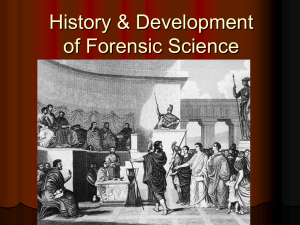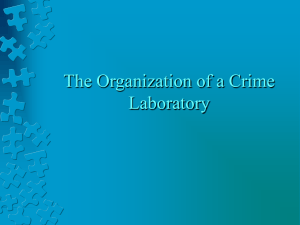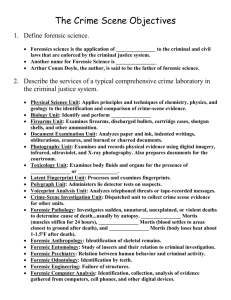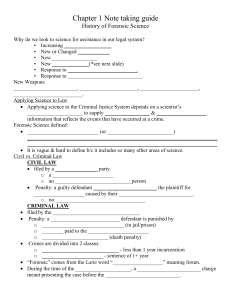FORM 335 - Harrisburg Area Community College
advertisement
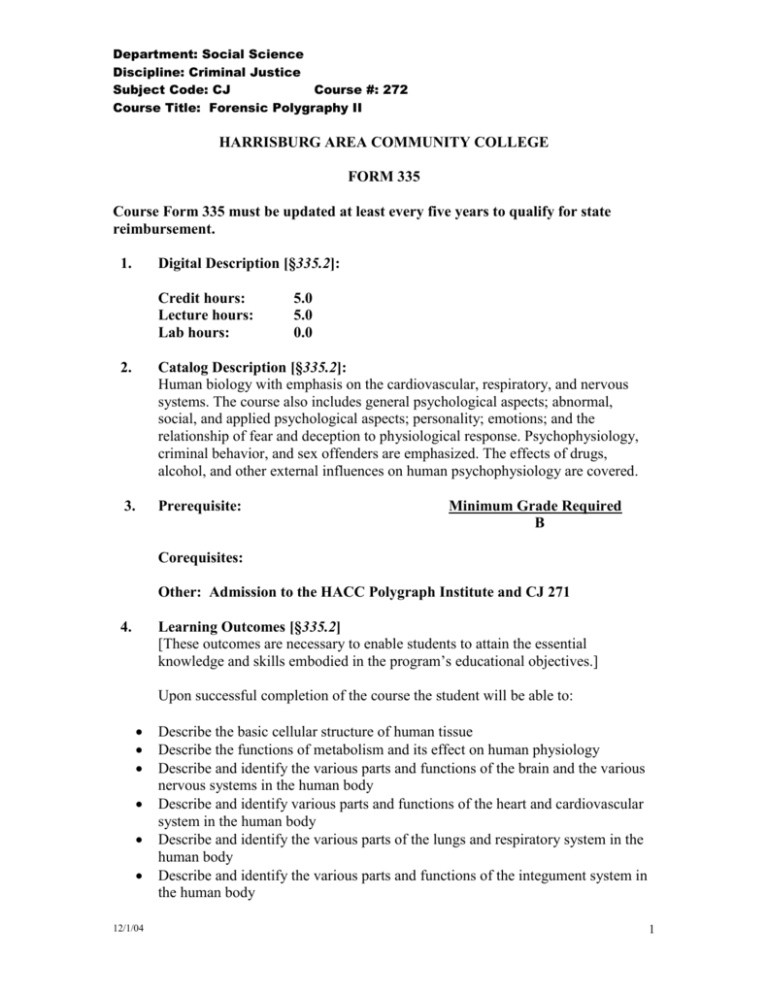
Department: Social Science Discipline: Criminal Justice Subject Code: CJ Course #: 272 Course Title: Forensic Polygraphy II HARRISBURG AREA COMMUNITY COLLEGE FORM 335 Course Form 335 must be updated at least every five years to qualify for state reimbursement. 1. Digital Description [§335.2]: Credit hours: Lecture hours: Lab hours: 5.0 5.0 0.0 2. Catalog Description [§335.2]: Human biology with emphasis on the cardiovascular, respiratory, and nervous systems. The course also includes general psychological aspects; abnormal, social, and applied psychological aspects; personality; emotions; and the relationship of fear and deception to physiological response. Psychophysiology, criminal behavior, and sex offenders are emphasized. The effects of drugs, alcohol, and other external influences on human psychophysiology are covered. 3. Prerequisite: Minimum Grade Required B Corequisites: Other: Admission to the HACC Polygraph Institute and CJ 271 4. Learning Outcomes [§335.2] [These outcomes are necessary to enable students to attain the essential knowledge and skills embodied in the program’s educational objectives.] Upon successful completion of the course the student will be able to: 12/1/04 Describe the basic cellular structure of human tissue Describe the functions of metabolism and its effect on human physiology Describe and identify the various parts and functions of the brain and the various nervous systems in the human body Describe and identify various parts and functions of the heart and cardiovascular system in the human body Describe and identify the various parts of the lungs and respiratory system in the human body Describe and identify the various parts and functions of the integument system in the human body 1 Department: Social Science Discipline: Criminal Justice Subject Code: CJ Course #: 272 Course Title: Forensic Polygraphy II 5. Describe the various functions of the endocrine system in the human body and its relationship to behavior and criminal behavior Explain and describe the interfacing and interaction of the various human body systems Explain, describe, and identify general psychological concepts as the apply to forensic psychophysiology Describe the concepts of the biological predispositions to Freud’s Id, Ego, and Superego Describe the general principles and theories of psychotherapy, to include psychoanalysis, behavioral, humanistic, cognitive, and neo-Freudian approaches Describe human personality and its relationship to criminal behavior and forensic psychophysiology Describe and identify DSM-IV diagnoses, including anxiety disorders, mood disorders, personality disorders, bi-polar disorder, schizophrenia, childhood disorders, phobias, and DSM “V” codes and their relationship to criminal behavior and forensic psychophysiology Describe the basic concepts or emotion, particularly fear and anger, and their impact on physiological systems of the body as well as the impact of other emotions and their relationship to forensic psychophysiology Describe basic criminological principles and criminal personality traits and their relationship to forensic psychophysiology Describe and identify concepts of criminal behavior with emphasis on rapists and sex offenders, and the various sexual paraphilias Describe the effects of personality disorders on PDD examinations Describe moral development and all aspects of abnormal psychology (DSM) and their relationship to criminal behavior and forensic psychophysiology Explain causal issues relating to sex offenders and origination theories Describe moral development and lack thereof and its relationship to criminal behavior and forensic psychophysiology Define and describe operant learning and conditioning and its relationship to criminal behavior and forensic psychophysiology Describe psychological theories and principles as well as the limitations of psychological diagnosis and their relationship to criminal behavior and forensic psychophysiology Describe and recognize the effect of ingested substances and substance abuse on human psychophysiology and PDD examinations: e.g., psycho-pharmacology and medical approaches, particularly action potential and transient exuberance Describe psychophysiology and its forensic aspects Planned Sequence of Learning Activities [§335.2] [These must be designed to help students achieve the learning outcomes.] A. B. 12/1/04 Overview of human physiology and systems of the human body; Examination of human cellular structure; 2 Department: Social Science Discipline: Criminal Justice Subject Code: CJ Course #: 272 Course Title: Forensic Polygraphy II C. D. E. F. G. H. I. J. K. L. M. N. O. P. Q. R. 6. Examination of metabolism and its effect on human physiology; Examination of the brain and central nervous system, autonomic nervous system, heart and cardiovascular system, lungs and respiratory system, integument system, and digestive system; Examination of the interfacing and interaction of the various systems of the human body; Examination of general psychological principles; Examination of the ego, id, and superego; Examination of Maslow’s Theory of Hierarchy of Needs; Psychological theories on violence and aggression; Overview of human personality traits and abnormal psychological principles; Overview and examination of human emotions with emphasis on fear and anger; Overview of criminological theories; examination of the criminal personality theories of Yochelson and Samenow; and overview of theories of criminal behavior; Examination of theories of rape and those who commit it; examination of sexually deviant behavior; and examination of child sexual abuse; Examination of the effects of personality and psychological disorders on PDD examinations; Examination of fear and its relationship to deception and the relationship of both to psychophysiological response; Examination of the principles of psychophysiology; Examination of the effects of drugs and alcohol on PDD examinations. Quizzes, Examinations, and Extensive Outside Work. Assessment of Student Learning [Methods of assessment should be appropriate for Learning Outcomes listed above.] Assessment of student learning outcomes for the course, as required by AP 765, is part of regular curriculum maintenance and/or improvement. The specific plan has been determined by the pertinent faculty involved and is maintained in the College’s assessment management system. 7. List of Texts, References, Selected Library Resources or other Learning Materials (code each item based on instructional use): C-Lecture/Laboratory, A-Lecture, B-Laboratory, LC-Lecture/Clinical, CLN-Clinical, I-Online, BL-Blended, D-Independent Study, P-Private Lessons, E-Internship, F-Cooperative Work-Study, FE-Field Experience. [These resources must be easily accessible to students.] Required Textbooks for Full-time and Adjunct Instructors 12/1/04 3 Department: Social Science Discipline: Criminal Justice Subject Code: CJ Course #: 272 Course Title: Forensic Polygraphy II 12/1/04 1. Abrams, Stanley. The Complete Polygraph Handbook, (Latest Edition). San Francisco, CA: Jossey-Bass Publishers. 2. Black, Donald and Larson, Lindon. Bad Boys, Bad Men: Confronting Anti-Social Personality Disorder, (Latest Edition). New York, NY: Oxford University Press. 3. Hare, Robert. Without Conscience, (Latest Edition). New York, NY: Guilford Press. 4. Izard, Carroll. The Psychology of Emotions, (Latest Edition). New York, NY: Perseus Publishing Company. 5. Lahey, Benjamin. Psychology: An Introduction, (Latest Edition). Guilford, CN: Mcgraw-Hill. 6. Mader, Sylvia. Inquiry Into Life, (Latest Edition). Guilford, CN: Mcgraw-Hill. 7. Matte, James. Forensic Psychophysiology Using the Polygraph: Scientific Truth Verification -Lie Detection, (Latest Edition). Eastsound, WA: JAM Publishing Company. 8. Matte, James. Examination & Cross Examination of Experts in Forensic Psychophysiology, (Latest Edition). Eastsound, WA: JAM Publishing Company. 9. Niehoff, Debra. The Biology of Violence (How Understanding the Brain, Behavior, and Environment Can Break the Vicious Circle of Aggression), (Latest Edition). Free Press. 10. Samenow, Stanton. Inside the Criminal Mind, (Latest Edition). New York, NY: Times Books Publishing Company. 11. Samenow, Stanton. Before It’s Too Late: Why Some Kids Get in Trouble & What Parents Can Do About It, (Latest Edition). New York, NY: Times Books Publishing Company. 12. Simon, Robert. Bad Men Do What Good Men Dream: A Forensic Psychiatrist Illuminates the Darker Side of Human Behavior, (Latest Edition). Washington, DC: American Psychiatric Press. 13. Strongman, K.T. and Strongman, K.T. The Psychology of Emotion: Theories of Emotion in Perspective, (Latest Edition). New York, NY: John Wiley & Sons. 4 Department: Social Science Discipline: Criminal Justice Subject Code: CJ Course #: 272 Course Title: Forensic Polygraphy II 14. Yochelson, Samuel and Samenow, Stanton. The Criminal Personality: A Profile for Change, (Latest Edition). Blue Ridge Summit, PA: Jason Aronson Publishers. 15. Yochelson, Samuel and Samenow, Stanton. The Criminal Personality: The Drug User, (Latest Edition). Blue Ridge Summit, PA: Jason Aronson Publishers. 16. Arther, Richard, “Journal of Polygraph Science”, Various Articles, 1964 to Present. 17. Criswell, Elmer, "Examination and Admissibility of Polygraph Evidence and Polygraph Law in the United States", Unpublished Master’s Thesis, Eastern Kentucky University, 1979. 18. “Polygraph: Journal of the American Polygraph Association”, Various Authors & Articles, 1972 to Present. 19. Extensive handout material from the Department of Defense Polygraph Institute and the National Training Center of Polygraph Science as well as other sources. 20. Various professional video productions on physiology, psychology, emotion, criminal behavior, and psychophysiology. 8. Prepared by Faculty Member: Elmer Criswell Date: 3/2006 9. Approved by Dean: Thaddeus Sampson Date: 3/2006 This course meets all reimbursement requirements of Chapter 335, subchapters A / B. This course was developed, approved, and offered in accordance with the policies, standards, guidelines, and practices established by the College. It is consistent with the college mission. If the course described here is a transfer course, it is comparable to similar courses generally accepted for transfer to accredited four-year colleges and universities. Whether transfer or career, this course is articulated with other courses so that it is an elective or a requirement of one of the college programs and it does not require students to have more than 30 credit hours of post secondary study prior to enrolling in the program. 12/1/04 5 Department: Social Science Discipline: Criminal Justice Subject Code: CJ Course #: 272 Course Title: Forensic Polygraphy II 10. VP, Academic Affairs and Enrollment Management: Ronald R. Young Date: 11. Original Date of course approval by the college: Spring 2002 12. Date(s) of subsequent reviews: Textbooks updated April 2002, March 2003 Revisions: Project 3/2006: Learning Outcomes (dmt) 12/1/04 6


